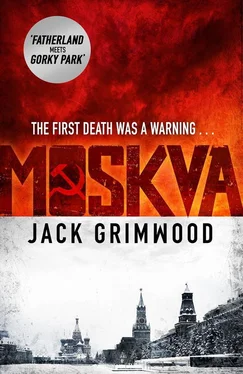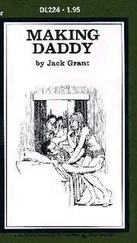When the man glanced up, Dennisov waved.
The driver knew the block well enough, but when Dennisov showed him Alex’s photograph he shook his head, both to say he’d never seen her and at the state of the world. Climbing back into his machine, he clamped his noise-protectors firmly to his ears and returned to scraping rubble.
‘Your boss is important?’
Tom nodded.
‘He might not like what we find.’
When they finally reached the right place, the apartment blocks were even more ruined than Tom had expected. Five-storey Khrushchevkas backing on to a railway track, jerry-built, thrown up in the 1960s as part of a five-year plan to solve the housing shortage. According to Dennisov, the five-year plan never ended, and nor did the housing shortage. Khrushchevkas kept being built. They were still prefabricated, still low-ceilinged and they still leaked.
‘Okay,’ Dennisov said. ‘Now keep your mouth shut.’
An old woman protested as they pushed through a front door reinforced with sheets of blue-painted steel. A crop-haired boy in the hallway took one look and turned for the stairs. Dennisov grabbed him, shook his head and jerked his thumb towards the door. The boy took himself outside.
Inside the communal kitchen, an old Georgian in a string vest sat by a saucepan boiling beef shank. A red onion stood on a butcher’s block next to three carrots and the air was thick with sour steam. He stood when he saw Dennisov, and then sat again. A teenage girl, breastfeeding a newborn, with a toddler at her hip, turned away to cover herself and then shrugged.
Dennisov showed her the photograph.
She shook her head firmly. ‘ Nyet. ’
The man boiling meat reached for the picture, examining it carefully. He too shook his head. Without being asked, he went to the door and shouted into the stairwell. A minute later, two Tartar women came down. Neither had seen Alex. Nor had the old Russian woman who appeared after that, grumbling about her husband’s shouting.
It was the crop-haired boy outside who gave Dennisov the lead.
One of the men in the block had been having a New Year’s Eve party. The boy couldn’t say it was the right party. It didn’t seem the sort of party a girl like that would go to, but all the same. It had been quite near here.
What did this man do?
Military. Kept himself to himself.
What time did the boy think he’d be home?
Who could say? He hadn’t been seen for two days.
Dennisov asked if anyone else had come looking for him and the boy’s face closed down for a second, then he realized he was too far in to back out and he’d already said too much, or not enough.
‘The police came.’
‘ Militsiya . Here?’ Dennisov looked around him.
‘Different police. They took everything. Even his bedding.’
The boy took the packet of papirosa Tom tossed across and gave them the address for the party he’d mentioned. There were no Khrushchevkas there. Only a smoking warehouse beside a shop selling second-hand water heaters. The shop was a scorched ruin, still smoking in places; half the warehouse had fallen in, taking the party wall with it.
A militsiya man stood at the corner, staring uninterestedly at a half-broiled rat that had made it to the road before dying.
‘You’d better wait here,’ Dennisov said.
Taking up position by a fence, Tom tapped a Russian cigarette from its paper packet and glanced casually in both directions. His new shadow was threading his way between an oil drum and a doorless fridge. He stopped the moment Tom looked at him and dipped to tie his shoelace.
Then Dennisov was back, his face grim.
‘There’s a body,’ he said.
Tom was moving before Dennisov could stop him, heading for the door into the smoking ruin. When the militsiya man moved to stop him, Dennisov barked something and the policeman hesitated, shrugged and stood back.
‘What did you just say?’
‘I told him you were KGB.’
The ground under their feet was sodden and the walls damp. There were patches of smouldering rubble but the fire itself was out. The ceiling had fallen in halfway along, leaving a cathedral-like gap to stone beams.
The warehouse was far older and better built than the buildings around it, and its brick walls had helped keep the flames in check. There’d been a party, according to the militsiya man. A three-day party no one had dared ring in to the police.
‘The body’s at the back,’ Dennisov said.
On the floor, almost against a wall, a carbonized figure twisted in agony. Tom knew its apparent anguish was down to muscle contraction but he looked away just the same and had to make himself look back. Fire had eaten eyes, ears, lips and hair. The head was thrown back, the mouth open in a teeth-baring scream.
If there had been any clothes, and Tom’s instinct said not, they’d wicked fat from the body as it burned and long since turned to ash. Even given the state the corpse was in, Tom could see there was something wrong with its arms.
Dropping to a crouch, knowing that he was contaminating a crime scene, Tom supported himself on the wall, finding the brick still warm to his touch.
The figure’s wrists were tied with wire.
Fire had eaten the hands and finger bones had fallen away.
As Tom sat back, a circle of metal caught the daylight coming in from above. Tom shook it free from bone, knowing he shouldn’t, and a half-circle of jade dropped away from the cheap steel beneath.
He was holding Alex’s ring.
He knew it was Alex’s ring. It was the one she’d been wearing on New Year’s Eve… Retrieving the half-circle of burned jade, Tom looked for the other half and realized it would take several hours and a sieve to sort through the rubble on which he knelt. Dennisov was waiting behind him.
‘You think it’s her?’ Dennisov said finally.
Tom did, but he made himself look again.
Then, before he could give himself time to reject the idea, he lay down in the dirt beside the body to judge its height against his and felt relief sweep through him so fast he had to fight back tears. He’d been wrong. It wasn’t her.
‘You all right?’ Dennisov asked.
Clambering to his knees, Tom brushed off his trousers and brushed half-effectually at his coat. ‘Can you find out when the fire started?’
Dennisov vanished to ask.
Tom had regained control of himself by the time Dennisov returned.
‘The coroner’s van’s on its way,’ Dennisov said. ‘I’ll tell you the rest when we’re out of here.’ Without waiting to see if Tom followed, he limped for the street, not wanting to be found at a crime scene, and nodded as he passed the militsiya man, who watched him go with interest. Dennisov might have changed his metal leg for something more discreet but his limp was still noticeable. Tom passed by without acknowledging the man at all.
As he imagined a KGB officer might do.
‘It was called in yesterday by a passing police car,’ Dennisov said. ‘The fire brigade were here until an hour ago. They put out what was left of the fire, called in the body and left.’ He shrugged. ‘This area falls between three districts and is full of undesirables. Our friend back there imagines everyone hoped someone else would deal with it.’
‘How do I find out if it’s Kotik, a teenage boy who liked swimming?’
Dennisov shot him a sideways glance.
‘I was given the name,’ Tom said hastily. ‘By the person who gave me this address. Well, the last address. Kotik is a friend of the missing girl.’
‘Who had enemies.’
‘Someone did, definitely,’ Tom said. ‘Now, how?’
‘Your boss will have to ask the authorities.’
‘What are his other options?’
Читать дальше









![Георгий Турьянский - MOSKVA–ФРАНКФУРТ–MOSKVA [Сборник рассказов 1996–2011]](/books/422895/georgij-turyanskij-moskva-frankfurt-moskva-sborni-thumb.webp)


